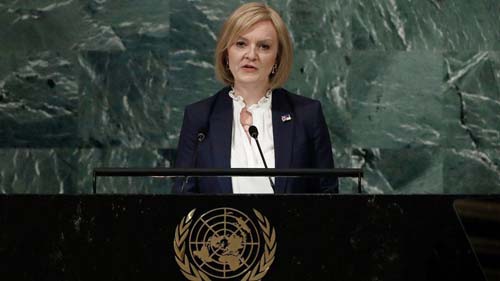
Truss’s ‘revolution’ will impress no one
Christopher Phillips
Britain’s new Prime Minister, Liz Truss, used her speech at the UN General Assembly to outline her vision for the UK and the world. She called for democracies to stand up and be counted in the face of destabilizing authoritarian aggression.
Truss’s team were keen to emphasize that this meant new economic as well as security policies, and on Friday the UK finance minister Kwasi Kwarteng duly announced Britain’s largest swath of tax cuts and increased borrowing since the early 1970s.
However, if Truss believes this will inspire other Western leaders, she is mistaken. The neo-liberal “trickle-down” economic policies that she favors are outdated and unpopular. While the tax cuts and deregulation of Ronald Reagan and Truss’s heroine Margaret Thatcher prompted significant growth in the 1980s, a decade later both the American and British publics had elected leaders who preferred liberalism with softer edges: Bill Clinton and Tony Blair. Since then, two US presidents, George W. Bush and Donald Trump, have tried to revive the approach, but without sparking significant growth.
Indeed, experts increasingly challenge “trickle-down” economics. The IMF dismissed the concept in 2015, arguing that it increased inequality. The two major crises to hit Western economies in recent decades, the 2008 financial crash and the COVID-19 pandemic, both prompted major government interventions that were welcomed by the public. Truss is not operating in the same climate as Thatcher did in the 1980s, when arguably there was at least some appetite for radical economic change. In Britain, surveys have shown the public support government intervention to narrow the gap between rich and poor, and few seem to be clamoring for Truss’s tax cuts that mostly benefit the rich.
In Britain, surveys have shown the public support government intervention to narrow the gap between rich and poor, and few seem to be clamoring for Truss’s tax cuts that mostly benefit the rich.
Nor are her views shared by fellow Western leaders: quite the opposite. In a move many saw as a swipe at Truss, US President Joe Biden said he was “sick and tired of trickle-down economics. It has never worked.” France meanwhile has been increasing, not cutting, taxes, focusing on wealthier homeowners — a group that will benefit under Truss’s plans in the UK.
But it is not just the economic message that is unpalatable, it is also the messenger. The UK today is more marginal within the Western alliance than at any time since the Second World War. While its efforts in Ukraine have been welcomed, they have not offset the bitterness brought about by Brexit and its fallout. The very people Truss is trying to convince to change their economic approaches, the EU and the US, are suspicious of her government. Her recent promise to amend the Northern Ireland protocol, possibly breaking international law and threatening the Good Friday Agreement, worries both Washington and Brussels and hasn’t exactly warmed them to the UK’s new premier. While Britain may once have been admired by its Western allies and been able to inspire them on politics and economics, those days seem long past.
The fallout from Brexit will also surely make Western leaders question the ability of Britain’s leaders to pull off the economic improvements they expect. Truss argued in her UN speech that she was aiming for an average 2.5 percent annual GDP growth. But similar optimistic forecasts were made by the Leave camp during the Brexit referendum campaign, and haven’t come to fruition. Indeed, the UK is on the brink of a Brexit-related recession. So why should now be any different? From the outside Truss and her team look more like ideological zealots than competent economic visionaries, and following them down an uncertain path will appeal to few.
Of course, Truss may prove the doubters wrong. Her discarding of economic orthodoxy may yet deliver the dramatic growth she predicts, without the horrific inequality that skeptics warn of. But only then will the rest of the “free world” take notice. After years of instability and squabbling over Brexit, the UK is hardly a model of how best to manage an economy. If it wants to reclaim past respect and authority, it must show itself to be a success before lecturing others. Truss’s economic policies may prove to be one way to achieve this, but they may also lead to disaster, setting Britain back even further.
The writer is professor of international relations at Queen Mary University of London, author of The Battle for Syria and co-editor of What Next for Britain in the Middle East
